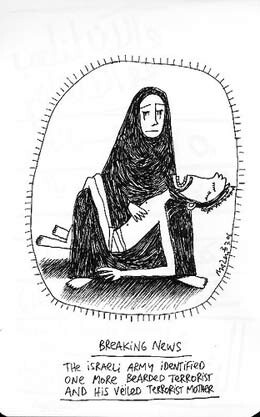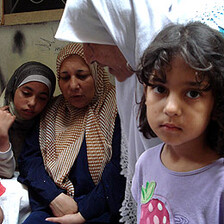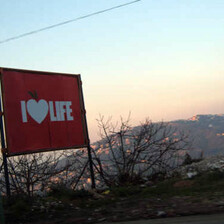Beirut 5 August 2006

“Pieta” by Mazen Kerbaj. View more of his work.
They were men and agricultural workers.
They were workers having a break after a long day of peach and plum picking, resting to continue their day of work that extends to the night.
They were men, thirty-three of them, who died because they were working at a time when we are supposed to be all sitting home scared or demonstrating against the resistance as the enemy wishes.
Maybe some of them were fathers, maybe others were working even under the constant surveillance of the Israeli “Super MK” planes in order to save some money to get married. Maybe others were orphans working in order to help their siblings. Maybe and maybe.
They were maybe called: Muhammad, Ahmad, Issa, Ali, Hani Fadi, Khaled, Hassan, Tarek … maybe and maybe.
Some of them were born with dark skin, others were lighter skinned turned darker by the Mediterranean sun under which they work everyday to earn money, a little bit of money for their children, or their siblings, or for a family they dream about.
I am saying “maybe” because the thirty-three workers who were massacred in cold blood by Israel, to add to the list of the massacres of Srifa, Qana, Marwaheen yet another massacre in the village of Qaa. No eulogies were made to them, no stories, no media coverage to tell us who they were, why were they working in Lebanon, what is it they were dreaming of, or what it was they were talking about at lunch when they were hit.
I am saying “maybe” because no songs were made for them, no love poems were written to them, their families were not visited and …
They were the silent workers who left silently a silent world that seems to feel the way the media tells it how to feel. If the murdered were women and children, we weep and cry, if they were men, they can die it’s not a big deal. Their faces might not be photogenic; the West would not feel if it sees their murdered bodies. After all, they were workers, poor Kurdish workers, from the same ethnicity for whose rights the US media and administration have launched a whole war in Iraq. After all, they were workers — male workers, not the helpless, hopeless women whom the West is coming to empower and liberate.
They were men, thirty-three of them. They were massacred at lunch break, footage of their bodies lying on the earth. They fed from their sweat when alive, and their blood when they were murdered.
They were thirty-three, they were massacred at lunch break and not until late afternoon that we started to get footage just of bodies lying, some covered with blankets and others not.
They were thirty-three, they were massacred and we will never hear or know their stories, their names, their dreams, their fears, their political views, not even what they thought of picking plums and peaches under the sun of the Bekaa.
They were thirty three, they were massacred and the world was watching but has not even been asked to condemn a massacre for workers!
Maybe because they were men as opposed to women and children.
Maybe because they were working as opposed to hiding in a shelter.
Maybe because they were working in a remote area in Lebanon.
Maybe because of their ethnicity - Kurdish - in a new Middle East aiming at preserving the rights of minorities.
Maybe because they were only thirty-three! And any number less than fifty is not considered a massacre anymore.
Maybe they are massacre number four and we are now normalized to the scenes of bodies laid in rows, a normal scene, a daily scene in this bloody war of democracy.
They were dead, they were thirty-three, they were massacred in broad daylight for anyone to see - is there anyone who sees?
For the thirty three workers whose name we do not know, whose stories we can’t tell, this mediocre testimony.
Related Links
Mayssoun Sukarieh is a native of Beirut





